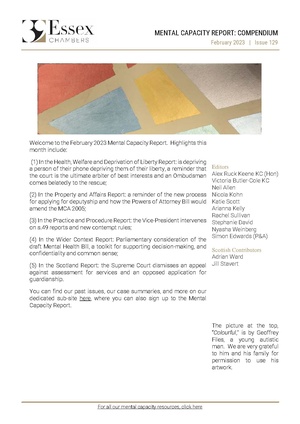Information for "R (Maher) v First-tier Tribunal (Mental Health) (2023) EWHC 34 (Admin)"
Basic information
| Display title | R (Maher) v First-tier Tribunal (Mental Health) [2023] EWHC 34 (Admin) |
| Default sort key | R (Maher) v First-tier Tribunal (Mental Health) (2023) EWHC 34 (Admin) |
| Page length (in bytes) | 3,117 |
| Page ID | 14802 |
| Page content language | en - English |
| Page content model | wikitext |
| Indexing by robots | Allowed |
| Number of redirects to this page | 1 |
| Counted as a content page | Yes |
| Page image |  |
Page protection
| Edit | Allow only users with "editing" permission (infinite) |
| Move | Allow only users with "editing" permission (infinite) |
Edit history
| Page creator | Jonathan (talk | contribs) |
| Date of page creation | 23:57, 13 January 2023 |
| Latest editor | Jonathan (talk | contribs) |
| Date of latest edit | 22:36, 26 March 2023 |
| Total number of edits | 9 |
| Total number of distinct authors | 1 |
| Recent number of edits (within past 90 days) | 0 |
| Recent number of distinct authors | 0 |
Page properties
SEO properties
Description | Content |
Article description: (description)This attribute controls the content of the description and og:description elements. | (1) The Mental Health Tribunal in its first decision, in which it had refused to provide the mother of a victim of manslaughter the reasons for the conditional discharge decision, or a gist of them, had unlawfully fettered its discretion by applying a blanket policy or practice. (2) Around a year later, after judicial review permission on the "blanket policy" ground had been granted, the Deputy Chamber President decided to make a further decision. The tribunal had power to make this decision under its case management powers, but the decision itself was unlawful: (a) instead of directing herself that departing from the open justice principle can only be justified in exceptional circumstances when strictly necessary to secure the proper administration of justice, the DCP jumped straight to the presumption of privacy contained in the tribunal's rules; as a consequence she did not engage with the purpose of the open justice principle which is to both assist in justice being done through transparency and also to enable the public to have confidence in the system; (b) her focus on the mother's motives, which should not have been given weight in the overall balance, clouded her consideration of other, more relevant issues; (c) she did not direct herself that the extent of the derogation from the principle of open justice should be no more than is strictly necessary to achieve the desired purpose, and did not consider providing the mother with a gist or summary of the reasons; (d) she did not explain why a redacted version of the conditional discharge decision could not meet the patient's privacy rights or why redacted reasons were "not possible"; (e) she did not adequately explain her reasons; (f) she did not engage sufficiently with the reasons that the mother had put forward. The court noted: "The direction of travel in the last 30 years or so has been towards openness and a more rigorous scrutiny of exceptions to the open justice principle and creative thinking about how conflicting rights can be reconciled." (3) The refusal to provide the gist of the reasons for the conditional discharge decision, when the Parole Board would have provided a gist of its reasons in similar circumstances, was unlawful discrimination under Article 14 in relation to the mother's Article 8 rights. (4) The tribunal's decision not to allow a Victim Personal Statement, and the inability of a victim to request a reconsideration, were not unlawful discrimination given the different functions of the PB and the MHT. |